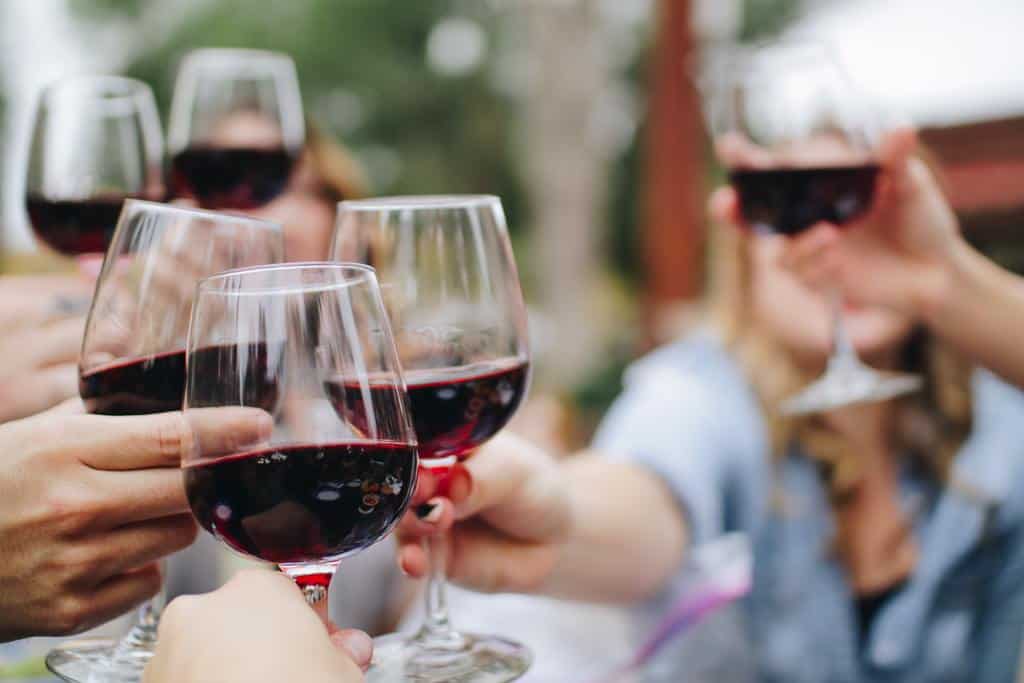 Since getting into the business of personal training and health coaching, I’ve observed some common thought patterns. I’ve noticed that most people prefer to control their weight with exercise without changing their diets. But weight loss and maintenance are much easier if you start with your diet.
Since getting into the business of personal training and health coaching, I’ve observed some common thought patterns. I’ve noticed that most people prefer to control their weight with exercise without changing their diets. But weight loss and maintenance are much easier if you start with your diet.
What we’re consuming is where all our calories are coming from in the first place. Exercise is meant to burn off those calories. So common sense says that if we consume fewer calories we won’t have to work as hard later to get rid of them. And alcohol affects weight loss by adding extra calories to our diets on top of what we’re eating.
Recently, I spent a couple of weekends with my extended family for different celebrations. This involved more eating and drinking alcohol than what’s normal for me. When I weighed myself later I had gained 4 lbs. Now I don’t believe in being perfect, but since weight maintenance is my goal this didn’t make me happy!
I’m no alcoholic, but I am aware that even light drinking can add up big over a short period of time. Let me give you an example. If you just drank one glass of wine every day, those calories add up to about 13 pounds in a year. And that’s just one glass a day which is considered “moderate” for women.
So even if you’re not a big drinker, weight control is much easier without it. Alcohol definitely affects our weight loss and maintenance efforts in several ways. It adds empty calories to our diets, disrupts our sleep (which affects our moods) and it impacts how much we eat.
Let’s start with the obvious.
The calories in alcohol
When it comes to nutrition, we have what we call the “macronutrients”. These are the nutrients our bodies need in the largest quantities in order to survive. The macronutrients are:
-
- Carbohydrates
- Protein
- Fat
- Water
Then we have the “micronutrients” which are also necessary for our bodies but we need them in much smaller amounts. These include:
-
- Vitamins
- Minerals
All the macronutrients give us energy (except for water) because they contain calories. Calories = energy. Micronutrients don’t contain calories so we don’t get any energy from them. The calorie counts for the macronutrients are as follows:
-
- Carbohydrates: 4 calories per gram
- Protein: 4 calories per gram
- Fat: 9 calories per gram
As you can see, I’ve left out alcohol because it’s a little different.
Alcohol contains 7 calories per gram but those are called “empty calories” because they don’t have any real nutrients. Alcohol is also different because it’s not necessary for our survival. So alcohol is adding to our calorie intake without giving us anything we need for health.
So what?
I think that’s important because being aware of calories makes it easier to drink smarter when you go out for an evening with friends. Another good thing to understand is that the higher the percentage of alcohol in a particular drink, the more calories it contains.
For example, light beers have about 4% alcohol and contain around 100 calories. But the “heavier” beers, like stouts, have between 7-11+% alcohol and contain somewhere between 200-300+ calories. It’s important to pay attention to those details.
Calories.info has a great chart to tell you how many calories are in some of your favorite drinks. They also give a pretty good explanation of where those calories come from. Once you’re aware of the calories you’re taking in, it gets easier to adjust your drinking habits.
If you’re trying to control your weight then every calorie counts. There are no labels on most alcoholic drinks so you need to know before you go. Education and planning are key, as always.
Eating usually accompanies drinking
Maybe you’ve noticed this…eating usually accompanies drinking alcohol. Surprise! Of course, that’s not a surprise. When we’re happily socializing and drinking away we tend to feel like eating too. And most of the time that food we’re eating isn’t the healthy kind!
One study showed that “alcohol consumption has a significant influence on the eating habits of college freshmen”. Now I know what you’re thinking, “I’m not a college freshman, I’m much smarter than I was back then”. And I’m sure you are. I’m guessing you’re not stumbling drunk out of a bar anymore. But let’s be honest.
As mature women, those of us that drink alcohol with our friends know that we do like to eat, or “munch”, while we drink. And how often do you have a quinoa salad with your alcohol? If you do, that’s awesome! But I would argue that the more common choices are crackers and cheese, bread dipped in oil, guacamole and chips, or some other fabulous and fatty treat.
We want to feel like we’ve risen above our college days in every way. But most likely only some small details have changed. Our choices may be more sophisticated now but they’re still full of decadent calories! This is an indirect way that alcohol affects our weight loss or maintenance efforts.
Alcohol affects sleep
I’ve always been a bit of an insomniac. So in my youth, I would sometimes drink alcohol before going to bed. Years later I learned that although alcohol causes drowsiness initially, it actually disrupts the quality of your sleep. So I might have gotten to sleep faster but I didn’t sleep as well.
When I don’t sleep well I feel tired the next day. I know now that when I feel tired I want to eat junk. I go right for the chips! And of course, those chips are full of empty calories for my body to store away.
I don’t want to be taking in unnecessary calories because I’m tired. And being tired won’t motivate me to exercise. So I think it’s smarter to do things right in the first place to get the best sleep. That way I can avoid all the unhealthy reactions to being overly tired.
It really helps to be aware of what you’re feeling and how you’re reacting to those feelings. This is why I write so much about mindfulness and motivation.
Related article: How mindfulness can help with weight loss and health.
Sleeping can become even more difficult as we get older. I started noticing more sleep problems in my 40’s. So drinking at any age can be tempting to help us get to sleep. But it won’t help you any more now than it did in your 20’s.
Making progress with age
As I grew older and made my health a priority, I switched drinking strategies. I decided to only drink in the late afternoon or at dinner. That way the alcohol would be out of my system by the time I went to bed and I would sleep better. That’s not a terrible plan, but I was still taking in extra calories that I didn’t need.
Now I’m thinking it would be a smarter idea to save my one drink a day for the weekends or special occasions. This decision is based on the fact that as I’m getting older every calorie counts more. They seem to stick easier with age! It also has to do with the fact that alcohol can raise your risk of cancer which I would like to avoid.
You can see how I’ve progressed over the years. I don’t want to have to exercise like a fanatic because of the calories I drink every day. I also value my sleep more now than in the past. To have better health and avoid disease, we have to keep adjusting our habits as we age.
Could alcohol be affecting your weight loss efforts by disrupting your sleep? If weight loss or maintenance is your goal, maybe it’s time to think about adjusting your habits to get better sleep.
Related article: The best exercise to reduce belly fat.
How alcohol affects women and seniors
Studies have verified that current trends among people age 60 and over show an increase in drinking, especially among women. Binge drinking is increasing even faster. This goes to show that we don’t always get smarter as we age! We still have to be vigilant.
One of the reasons for this trend could be the fact that as people retire they have less to do and a lot more time to do it in. Work takes up a lot of our time and when that goes away we’re not always sure how to fill our time. It’s important to find new hobbies that give us a purpose and a reason to be responsible.
As a woman, keep in mind that alcohol affects you more than it does a man. Women have less body water so the alcohol doesn’t get diluted like it does in men. That means it stays in our bloodstream longer and can do more damage to our livers.
The NIH says that “women develop alcohol-induced liver disease over a shorter period of time and after consuming less alcohol” than men. Just because you don’t feel the effects, doesn’t mean it isn’t happening.
Another point to remember is that as we age we tend to take more pills. These could be either prescription or non-prescription drugs. Just the everyday painkillers and cold medicines we use can be affected by the alcohol we drink.
Be sure to read the labels on any drugs you’re taking to see how alcohol may interact with them. Here’s a good list of common drugs and possible side effects of alcohol use.
My final thoughts
I really want you to ask yourself “why am I drinking and what am I getting out of it?” I’ve done this and realized that I’m drinking because it’s a mental habit now. I associate drinking with relaxing, but it’s not beneficial in any other way. I could instead save my drinking for special occasions or the weekends and have something to look forward to.
Experience and education have taught me how much alcohol affects weight loss and health. I think it’s easier to keep the weight off in the first place than to work out extra hard to play catch-up. I also prefer to keep my liver and body healthy over the long term.
If what you’re doing is working for your weight control efforts then you don’t need to make any changes. But if not, then I’ve hopefully given you some things to think about. I think it’s important to understand what we’re ingesting and our motivations for it so we can keep our actions in check.
My mother always used to say “if you have to drink to have fun then you’re not a very interesting person”. I think she was right! Having some insight and control doesn’t make you less fun, it just means you’re way ahead of the crowd.

